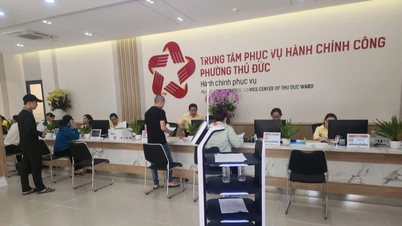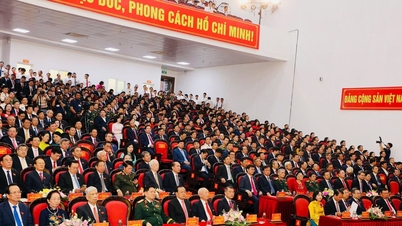The policy and legal foundation is increasingly improved.
Sharing at the Trade Promotion Conference in September 2025, Ms. Lai Viet Anh - Deputy Director of the Department of E-commerce and Digital Economy ( Ministry of Industry and Trade ) affirmed that the topic of digital transformation has never been placed in such an important and prominent role as it is today, considered one of the strategic breakthroughs for socio-economic development.
Over the past 5 years, Vietnam has built a solid macro-legal corridor for this process. Important strategic documents have been issued such as the national digital transformation program to 2025, orientation to 2030 (from 2020), digital economy and digital society development strategy to 2025, vision to 2030.
In particular, Resolution 57 has identified breakthroughs in science and technology, innovation and digital transformation as a key pillar.

In terms of law, the Law on Electronic Transactions 2023 and the newly issued Law on Digital Technology Industry Development have created a solid legal basis. In addition, the mechanisms to support businesses are also very specific, typically Decree 80/2021/ND-CP guiding the Law on Support for Small and Medium Enterprises, with clauses (11, 25, 26) clearly stipulating the financial support mechanism for businesses applying e-commerce and digital transformation.
E-commerce growth is impressive
Ms. Viet Anh emphasized that e-commerce is one of the leading fields in digital transformation in Vietnam, along with the finance and banking sector. The policy framework for e-commerce has existed very early, with the first decree issued in 2006 and the overall plans for e-commerce development in each 5-year phase have been issued continuously since then.
Thanks to a solid foundation and support from the State, the Vietnamese e-commerce market has continuously maintained an impressive growth rate of about 20% per year. According to the White Book of the Department of E-commerce and Digital Economy, the market size in 2024 is estimated to reach 25 billion USD, accounting for about 10% of the total retail sales of goods and consumer service revenue nationwide.
"The current level of e-commerce application is almost universal among businesses and consumers. This is the foundation for us to start thinking about bringing Vietnamese e-commerce to the world," Ms. Viet Anh shared.
To continue perfecting the legal framework, the Ministry of Industry and Trade is presiding over the drafting of the first E-Commerce Law and is expected to submit it to the National Assembly for approval next October.
Solutions to "bottlenecks" in exports
However, according to the Deputy Director of the Department of E-commerce and Digital Economy, businesses still face many barriers when promoting international trade. The biggest difficulties lie in finding partners, exploring new markets and lack of understanding of regulations and laws in the host country. Many businesses face challenges in maintaining product standards to meet demanding markets, limited capacity to build brands and have a long-term presence in the international market. Along with that, logistics, order fulfillment, payment and tax handling are also major obstacles.
In this context, applying digital technology can help businesses overcome difficulties in accessing the market. Global e-commerce platforms such as Alibaba and Amazon allow small and medium-sized enterprises to shorten the distance and access large markets at optimal costs.
Digital technology also supports analysis and synthesis of data from multiple sources to better understand the target market. Digitizing the supply chain and applying traceability helps manage product quality better, meeting the strict requirements of international markets, especially for agricultural products and medicinal herbs. At the same time, digital transformation brings great advantages in branding and logistics development.
To support the business community, the Department of E-commerce and Digital Economy has implemented many specific solutions such as training, capacity building, building a digital ecosystem and enhancing international cooperation.
Ms. Viet Anh said that to put the policy into practice, it requires the cooperation of many parties. Vietnamese Trade Offices abroad are expected to increase information sharing on digital consumption trends, local e-commerce platforms, and support connecting Vietnamese businesses with the e-commerce ecosystem in the host market. At the same time, it is necessary to implement activities to promote Vietnamese brands such as e-commerce weeks and cross-border livestream sales.
For businesses, it is necessary to proactively research the market, comply with legal regulations, invest in brands and improve operational capacity on digital platforms. In addition, businesses are recommended to actively apply technologies such as artificial intelligence (AI), data analysis, traceability, etc. in production and business activities, and participate in training and consulting programs from management agencies and support organizations.
“Digital transformation is not only an inevitable trend, but also a lever for Vietnamese enterprises to conquer international markets,” Ms. Viet Anh emphasized.
Source: https://doanhnghiepvn.vn/chuyen-doi-so/don-bay-chien-luoc-dua-hang-viet-vuon-ra-the-gioi/20251001083817534


![[Photo] Hanoi morning of October 1: Prolonged flooding, people wade to work](https://vphoto.vietnam.vn/thumb/1200x675/vietnam/resource/IMAGE/2025/10/1/189be28938e3493fa26b2938efa2059e)




































![[Photo] President Luong Cuong receives President of the Cuban National Assembly Esteban Lazo Hernandez](https://vphoto.vietnam.vn/thumb/1200x675/vietnam/resource/IMAGE/2025/9/30/4d38932911c24f6ea1936252bd5427fa)
![[Photo] Panorama of the cable-stayed bridge, the final bottleneck of the Ben Luc-Long Thanh expressway](https://vphoto.vietnam.vn/thumb/1200x675/vietnam/resource/IMAGE/2025/9/30/391fdf21025541d6b2f092e49a17243f)
![[Photo] The 1st Congress of Phu Tho Provincial Party Committee, term 2025-2030](https://vphoto.vietnam.vn/thumb/1200x675/vietnam/resource/IMAGE/2025/9/30/1507da06216649bba8a1ce6251816820)


























































Comment (0)